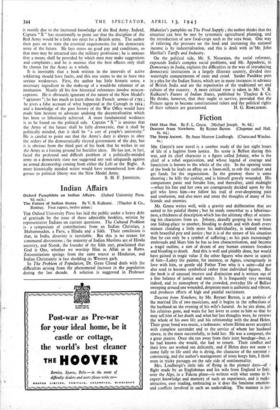Indian Affairs
The Future of Indian States. By V. B. Kulkarni. (Thacker & Co., Bombay. Four rupees, twelve annas )
Tint Oxford University Press has laid the public under a heavy debt of gratitude by the issue of these admirable booklets, written by representative Indians on current questions. The Cultural Problem is a symposium of contributions from an Indian Christian, a Muhammadan, a Parsi, a Hindu and a Sikh. Their conclusion is that, in India, diversity is inevitable. But this is no reason for communal dissensions ; the majority of Indian Muslims are of Hindu ancestry, and Nanak, the founder of the Sikh sect, proclaimed that God is Ope, whether we worship Him as Allah or as Rama. Zoroastrianism springs from the same source as Hinduism, and Indian Christianity is fast shedding its Western garb.
In The Problem of Population, Dr. Gyan Chand deals with the difficulties arising from the phenomenal increase in the population during the last decade. A solution is suggested in Professor Mukerjee's pamphlet on The Food Supply ; the author thinks that the situation can best be met by systematic agricultural planning, and the introduction of new food-crops such as the soya bean. One way of 'relieving the pressure on the land and increasing the national income is by industrialisation, and this is dealt with in*Mr. John Matthai's Tariffs and Industry.
On the political side, Mr. S. Natarajan, the social- reformer, expounds India's complex social problems, ;nd Mr. Appadorai, in Democracy in India, explains the difficulties in the way of introducing democratic institutions in a largely illiterate country, divided into watertight compartments of caste and creed. Sardar Panikkar puts in a plea for the Indian States, which are in many instances in advance of British India and are the repositories of the traditional art and culture of the country. A more critical view is taken in Mr. V. B. Kulkarni's Future of Indian States, published by Thacker & Co. He thinks, however, that they ought to survive, provided that the Princes agree to become constitutional rulers and the political rights


























 Previous page
Previous page